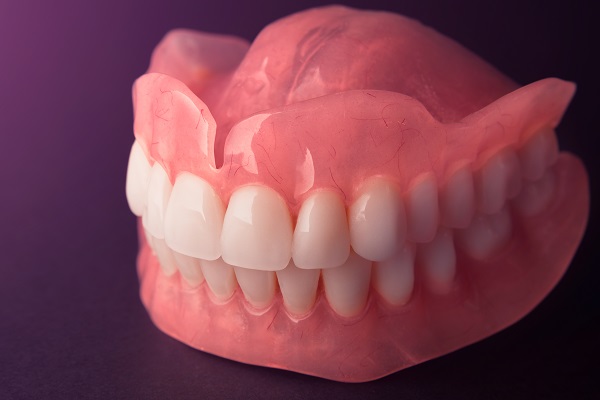Eating With Dentures: How Does it Feel?

Dentures are appliances used to replace natural teeth. Eating with them is not like eating with your regular teeth. Adjusting to eating with new dentures takes a little practice and time. You may have to change how you handle your food.
Eating with dentures
It takes some time to get used to dentures. Fortunately, with some simple strategies, a person can manage them successfully. New denture wearers find that chewing feels different with them. Sometimes, a person may think that food has lost its flavor. While a person is adjusting to wearing them, the mind receives strong signals from the mouth about them, which overpowers messages from the taste buds. After a person becomes accustomed to dentures, the mind will pay more attention to the taste buds and less attention to them.
During the adjustment period, a person may have trouble sensing hot drinks and foods. This is a common problem new denture wearers experience. People should be careful not to burn their mouths. Here are some tips for eating with dentures.
Soft foods
To get used to new dentures, people should start slowly with soft foods, such as fish, eggs, cooked vegetables, puddings and chopped meat. Food should be cut into small pieces or thin strips. Vegetables and fresh fruits should be chopped or sliced into tiny pieces. This will make it easy to chew or cook them before serving.
Chew on both sides
A person should chew slowly using both sides of the mouth. Food should be distributed evenly. A patient should chew half of the food in the mouth on the back-right side and the other half on the back-left side. This will help even out the pressure on the dentures. It will also keep them more stable.
Gaining confidence
Over a few weeks or days, a person will feel more comfortable eating with them. At this point, introducing firmer foods to the diet is encouraged. A person can also try eating chewier foods such as celery and steak. But people are advised to still avoid foods that are extremely hard or sticky and meals that contain sharp bones or shells. This is necessary to avoid damaging the dentures.
What to avoid
People should avoid chewing gum while wearing dentures. Dentures and chewing gum do not often work well together. The gum may stick to the acrylic plastic in the denture and may end up breaking a seal which will loosen them. Gum may also remain stuck to the denture and can eventually harden and discolor. People should also avoid using toothpicks and biting at the front of the mouth when they have dentures in.
Contact your dentist
Eating with dentures may be uncomfortable for a few weeks. Although eating with them is not as convenient as eating with natural teeth, dentures are a good alternative. When you become accustomed to them, you can relax and enjoy a wide variety of foods. If you are thinking about getting dentures, contact your dentist as soon as possible.
Are you considering getting dentures in the Albuquerque area? Get more information at https://familychoicedentistry.com.
Check out what others are saying about our services on Yelp: Read our Yelp reviews.
Related Posts
Wisdom teeth tend to disrupt the balance of your oral environment. As these third molars develop, dental issues emerge. One of them is a dentigerous cyst. It is a fluid-filled sac that grows in the soft tissue and jawbone. Dentigerous cysts from wisdom teeth can carry dental problems. If you want to understand the dental…
Wisdom teeth extraction is common among teens and people in their early 20s. If you are around this age or have a child in this period of life, it is time to consider this procedure. Your dentist can evaluate you or your son or daughter to determine the appropriate next steps. These third molars often…
A TMJ dentist can help patients address pain, stiffness, and other complications linked to the temporomandibular joints. These joints near the ears are responsible for jaw movement, including speaking, chewing, and yawning. When dysfunction arises, it can significantly impact daily life. Recognizing the signs early and consulting the right dental professional is essential for effective…
It may be time to remove your wisdom teeth, but your dentist can confirm. If the dental professional believes this is the right decision, you want to go into the procedure feeling comfortable. Removing these third molars can be an invasive process that requires several days’ recovery. Make sure you learn everything you can about…
